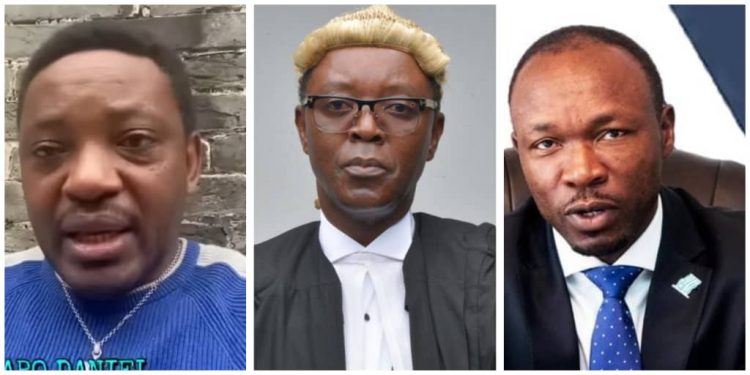The former deputy defence commander of the separatist armed group, Ambazonia Defence Forces, Capo Daniel, has offered new insights into the killing of vibrant opposition Senator, Henry Kemende, in 2022.
Ngong Emmanuel, popularly known as Capo Daniel, contradicted his earlier accusations against the Cameroon military by stating that the Ambazonia Governing Council President Ayaba Cho Lucas, who controls the ADF, ordered the senator’s killing.
Barrister Henry Kemende, a vocal Senator of the opposition Social Democratic Front (SDF) party, was shot dead in Nkwen, Bamenda, on January 11, 2022.
Gunmen pulled him from the car and rained bullets on his chest before taking off with the vehicle. He died in the hospital moments later.
While no group claimed responsibility for the attack, the SDF’s Vice-Chairman, Hon. Joshua Osih (who is now Chairman), said in an interview that separatist fighters were behind it.
Capo Daniel’s recent statement is the first responsibility claim made by a separatist leader, two years after the Senator’s assassination.
In a video posted on his YouTube channel on March 18, 2024, Capo Daniel affirmed that ADF fighters killed Senator Kemende based on orders from Lucas Ayaba Cho.
“I, Capo Daniel, stand as a witness, the topmost person who worked with Ayaba Cho as his deputy defence chief, his top negotiator, the one who controlled all defence issues on ground zero, I stand to tell you that the ADF killed Kemende on Ayaba Cho’s order, at Mile 2 Nkwen,” said Capo Daniel.
He alleged that Ayaba Cho had made it a policy for his fighters to kill anyone they perceived was collaborating with the Cameroon government, including senators like the late Barrister Kemende, who were participating in the governance of Cameroon.
“Why is Ayaba Cho struggling to destroy everyone who looks like a strongman in Ambazonia?” Capo Daniel wondered.
“Kemende was a strong Ambazonia supporter, like a majority of our people. Fru Ndi was the strongest Ambazonia supporter. He led his parliamentarians in Bamenda for us to protest when we could not.
“The only thing is that people like Ayaba Cho have been going out after these people to kick out anything they see as competition. Remember Ayaba Cho said Sisiku is in this struggle for relevance. Who says that to someone who is in prison for the struggle?”
After falling out with Lucas Ayaba Cho last year, and subsequently resigning from the ADF, Capo Daniel has been quite vocal against Cho’s actions, especially on abuses against civilians in the English-speaking Regions of Cameroon.
Ayaba Cho also thinks Daniel is working with the Cameroon government to weaken his group and the separatist movement.
Controlled by different diaspora-based leaders, the movement started in 2017 with a declaration of independence of the two English-speaking Regions by separatists.
From the independence declaration were born dozens of armed groups, whose frequent confrontations with the Cameroon military have claimed over 6,000 lives and displaced over a million people.
The Ambazonia Defence Forces, which is one of the many secessionist armed groups in the region, has masterminded several attacks on civilians.
Notable among them was the assassination of two civilians last year in Guzang, a village in the North West Region.
Capo Daniel played a key role in perpetrating some of the ADF’s abuses.
He claims he has always opposed attacks on civilians, although he justified the abduction of ruling party Senator Regina Mundi in May 2022. He also admitted separatist fighters’ responsibility for the killing of journalist Anye Nde Nsoh in Bamenda on May 7, 2023.
ADF’S COUNTER-ACCUSATIONS
When MMI questioned the Ambazonia Governing Council (AgovC), which controls the ADF’s actions, concerning the killing of Senator Henry Kemende, they did not refute Capo Daniel’s claims.
Rather, the group shifted the blame to Capo Daniel, who was directly in charge of the ADF’s ground operations at the time the senator was killed.
“Keep in mind Ndong Emmanuel was the deputy defence chief of the ADF who was responsible for the conduct and actions of the ADF who now speaks and works for Cameroun’s government,” the Ambazonia Governing Council spokesperson, Asu Lucas, told MMI.
“If he alleges that ADF killed Kemende, then you people (the Ambazonian public/ international community) should hold him responsible for Kemende’s death. Dr. Cho is the political leader, not a defence chief responsible for the daily conduct of the forces.”
SYSTEMATIC ATTACKS AGAINST OPPOSITION POLITICIANS
Senator Kemende was a vibrant lawmaker who firmly defended the plight of English-speaking Cameroonians at the Senate. But separatists totally opposed his parliamentary presence, and viewed all other Anglophones taking part in politics, governance, and administration in Cameroon as traitors.
These people became open targets of the separatists. Ayaba Cho has repeatedly issued threats against them for taking part in politics in Cameroon and this resulted in attacks against politicians, civil servants, and government sympathisers.
One of President Paul Biya’s most prominent opposition figures, the late Ni John Fru Ndi, who founded the SDF, became a frequent target of separatist fighters.
In 2019, separatists burned his home, kidnapped his sister, and shot at his driver in Bamenda for opposing their seperation agenda.
He was kidnapped in June 2019 by separatists before being released 24 hours later.
“They are doing all this because they accuse me of not supporting them and they want me to remove my members from the Cameroonian parliament. I wasn’t really in the mood to negotiate,” Ni John Fru Ndi told RFI after his release.
Also, separatist fighters in Batibo, North West, burned down the home of the late SDF Parliamentarian, Hon. Joseph Mbah Ndam, in 2019.
His only crime was that he was a member of the Cameroon National Assembly.
Senator Kemende’s killing was another instance of such systematic targeting of unarmed civilians by Ambazonia separatists, an act that has been strongly condemned by the national and international community.



